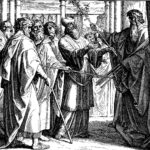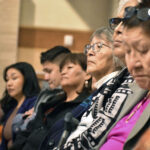LONDON (RNS) — At a rally on Downing Street in support of Israeli hostages in Gaza this summer, two British rabbis got up to speak. Less than three minutes into their speech, the rabbis were booed and jeered and forced off the stage.
Their offense? They raised the issue of Palestinian statehood.
The two rabbis, Charley Baginsky and Josh Levy, leaders of the Movement for Progressive Judaism, were fully on board in demanding the hostages’ return from Hamas captivity. But they also wanted to address the rights of Palestinians to a state alongside Israel.
And for that, there was little support among those who gathered at the Stop the Hate Rally, an event organized by a nonprofit whose goal is to fight antisemitism and to advocate for Israel.
Britain last week joined Canada, Australia, Portugal and a raft of other nations in recognizing a Palestinian state at the U.N., a push meant to increase pressure on Israel to end its ferocious two-year assault in Gaza.
But as British Jews, numbering close to 300,000, prepare for Yom Kippur, the Day of Atonement and the holiest day of the Jewish year, many are feeling beleaguered and isolated by their government’s decision to back statehood for Palestinians. And that defensiveness also pervades discussions within the Jewish community, where there is often backlash to any frank discussion of the subject.
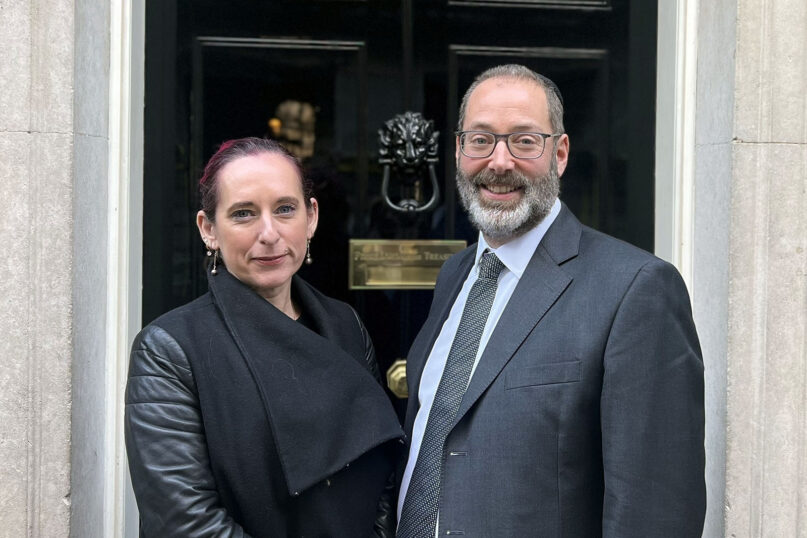
Rabbis Charley Baginsky, left, and Josh Levy at No. 10 Downing St. in London. (Photo courtesy of Progressive Judaism in the UK)
RELATED: To atone this Yom Kippur, you must drop your lizard
At a meeting with a Labour Party member of Parliament in the sanctuary of the New London Synagogue two weeks ago, David Tawil asked, “Why should Jews feel optimistic about our future in this country?”
Tawil later told RNS he feels betrayed by Prime Minister Keir Starmer’s statement recognizing Palestine and feels like British society has turned on Jews. Starmer was elected last year after working to root out perceived antisemitism from the Labour Party under its previous leader, Jeremy Corbyn.
Speaking of the recognition of Palestinian statehood, Tawil said, “Really, what it’s done is chuck the Jewish community in the U.K. under the bus. Because as much as people want to say we’re separate from Israel, in reality, we’re not separated from Israel.”
His views are widely shared. The Board of Deputies of British Jews, an elected body representing most streams of Jewish life, expressed “deep objections” at the recognition of Palestine. An editorial in The Jewish Chronicle, the London-based, independent weekly newspaper, declared the recognition “a victory for Hamas and terrorism.”
Even the two rabbis who spoke at the rally in support of a Palestinian state opposed their government’s recognition of Palestine.
“The most important value for us is the pursuit of peace,” Baginsky told RNS. “Whatever happens has to be with that goal in mind, and the government has done a rubbish job at articulating how this is going to be that steppingstone.”
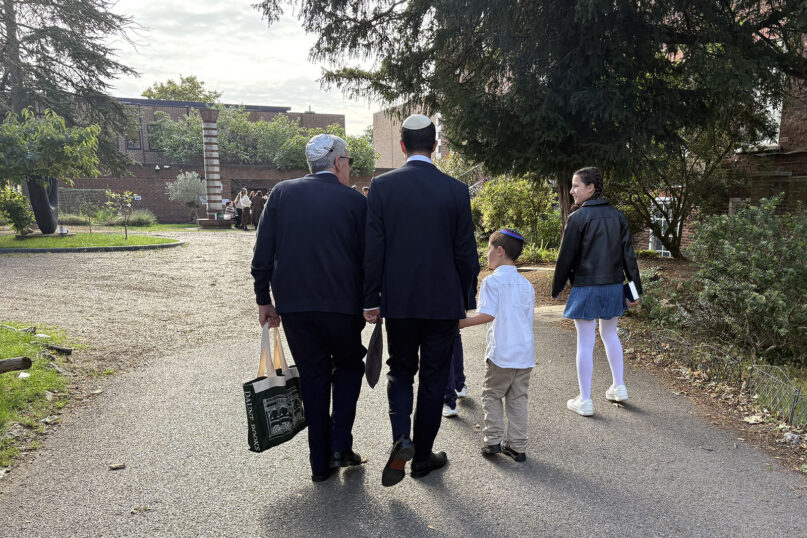
A Jewish family on their way to services at the New North London Synagogue on Rosh Hashana, Sept. 23, 2025. (RNS photo/Yonat Shimron)
Two years after the the Oct. 7, 2023, Hamas attack on Israel and the ensuing assault on Gaza — an assault that remains ongoing, has destroyed much of the enclave’s infrastructure and has killed more than 65,000 Palestinians — British Jews remain strongly supportive of Israel.
They are dismayed by the support voiced for Palestine and see defaced posters of Israeli hostages on city streets, pro-Palestine stickers and loud demonstrations in support of the people of Gaza.
And, as a new survey reveals, their support for a two-state solution has plummeted.
The survey of 4,822 British Jews conducted in June and July found that just 49% of British Jews supported a two-state solution as the only way to achieve peace, down from 77% in 2010 and 54% just one year ago. The survey was conducted by the Institute for Jewish Policy Research, a London-based group that studies British and European Jewry.
“This is a dramatic change of faith by British Jews in a proposal that has been the bedrock of Western policy on Israel-Palestine for decades,” the survey concluded.
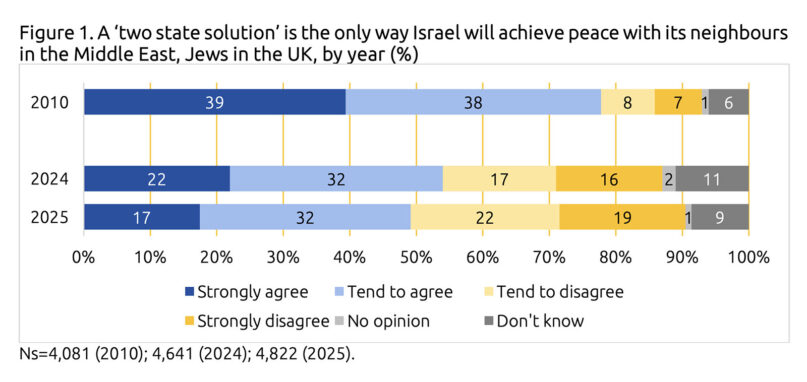
“A ‘two state solution’ is the only way Israel will achieve peace with its neighbours in the Middle East, Jews in the UK, by year (%)” (Graphic courtesy of the Institute for Jewish Policy Research)
The shift mirrors a decline in support for the two-state solution among Israelis, too. A Pew Research Center poll earlier this year found that only 21% of Israeli adults think Israel and a Palestinian state can coexist peacefully, down 14 percentage points since before the Israel-Hamas war started.
British Jews feel a strong attachment to Israel. A survey from last year found that a striking 88% of British Jews have visited Israel at least once.
“There is a deep bond between the majority of the British Jewish community and the state of Israel,” said Gavin Schaffer, a professor of history at Manchester Metropolitan University who has written about British Jews. “It’s not a matter of whether we support (Prime Minister) Bibi Netanyahu. It’s a matter of almost a familial bond.”
Most British Jews identify as modern Orthodox, and the number of Haredi Jews is growing. The U.K.’s largest Jewish denominational body is the United Synagogue, represented by Chief Rabbi Ephraim Mirvis, its spiritual head. Orthodox congregations tend to align more conservatively, both religiously and politically.
That does not mean there is unanimity on Israel. Many British Jews, particularly those in the more liberal streams of Jewish life, have sharply criticized Israel’s punishing war — one that convinced many international onlookers, including an independent U.N. commission of experts, that Israel is carrying out genocide.
Back in April, more than two dozen members of the Board of Deputies of British Jews signed an open letter published in the Financial Times criticizing the Israeli government’s war in Gaza. The letter’s signers wrote that they could not “turn a blind eye or remain silent at this renewed loss of life and livelihoods.” Condemning violence against Palestinians in the West Bank, they warned that “this extremism also targets Israeli democracy.”
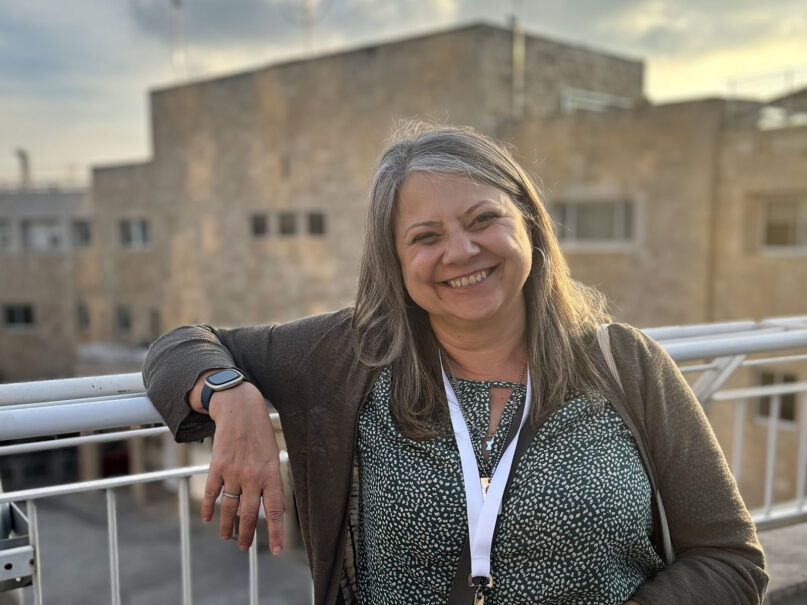
Rebecca Singerman-Knight. (Courtesy photo)
Rebecca Singerman-Knight, one of the signers, said she consulted with Israeli friends to make sure it was “coming from a position of love for Israel.”
“I’m against the current Israeli government, but I’m a passionate Zionist,” said Singerman-Knight, a piano teacher and a member of Kingston Liberal Synagogue in southwest London.
She and four others were, however, suspended from the Board of Deputies for breaching the body’s code of conduct by discussing the letter in the press. She is appealing the decision.
Singerman-Knight, too, had some reservations about the government’s recognition of Palestine.
“If they had said, there should be a viable path to peace with these milestones on the way, then I would be 100% behind that,” she said. “I’m ambivalent about the fact that they didn’t make it as clear straight away that it has to be dependent on Hamas being gone and all of the hostages released. That was deeply concerning.”
On this Yom Kippur, she feels a bit of hope that U.S. President Donald Trump’s proposal to end the war in Gaza might come to pass.
“I pray that this is successful,” she said, and we enter the Jewish New Year with the hostages home, Hamas disbanded and a real prospect of a stable peace in the future.”
RELATED: Hopeful for a new beginning in the new year, American Jews make historic trip to Syria


